Ivan Rybkin, a critic of Vladimir Putin and an ally of one of the Russian president's fiercest foes, dropped out of the presidential race Friday, nine days before the vote.
"I am withdrawing my candidacy, I will not participate in this farce," Rybkin said at a news conference just a little over a week ahead of the March 14 election, which Putin is widely expected to win in a landslide. Rybkin added that "working as an opposition candidate is very difficult."
He spoke after returning from a three-week trip abroad, having left Russia citing security concerns following a murky incident in which he went missing for days and claimed he was the victim of foul play.
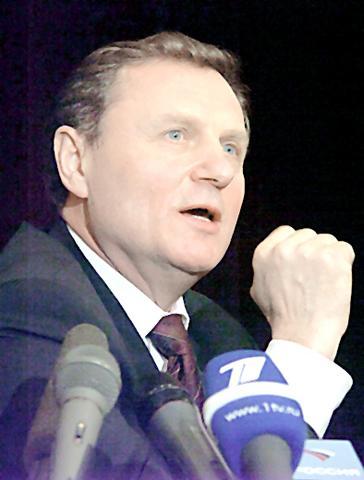
PHOTO: EPA
On Friday, Rybkin again suggested he was the victim of some kind of politically motivated persecution in connection with his candidacy. "I expected pressure, but I did not expect such lawlessness," he said.
Rybkin was running in the election with the backing of self-exiled tycoon Boris Berezovsky, a bitter enemy of Putin. His association with Berezovsky, one of the so-called oligarchs who made quick fortunes in post-Soviet Russia, and his lobbying for peace talks with Chechen rebels have made Rybkin an unpopular figure in Russian politics. Polls have suggested he would receive less than 1 percent of the total vote.
Rybkin's announcement came after a court rejected his complaint against the Central Election Commission over its decision to prohibit him from taking part in televised campaign debates via video link from London.
Rybkin had initially said that he would remain abroad until the election. He traveled to Britain, where Berezovsky lives, after disappearing for five days last month and then turning up in Ukraine. At first he said he had simply gone to Ukraine to take a break, but he then claimed he was lured there, drugged and made the subject of a compromising video.
Rybkin said he would not quit politics, pledging to speak out as if he were a candidate. In an apparent effort to display independence, he said he had not told Berezovsky of his decision before making the announcement.
Rybkin, a former parliament speaker and head of ex-President Boris Yeltsin's Security Council, was one of six candidates challenging Putin, but polls indicate a sweeping victory for the incumbent president.
The vote comes three months after the main pro-Putin party United Russia swept parliamentary elections following a campaign international observers said was unfair because of the government's use of the state-run media and other levers of power to influence voters.
Central Election Commission chairman Alexander Veshnyakov on Friday dismissed concerns from liberal candidates and other Putin critics that the president has benefited from lopsided media coverage. "Like it or not, any incumbent has certain advantages compared to other candidates," he told a news conference.
Veshnyakov said he expects turnout will reach at least 60 percent, clearing the 50 percent hurdle needed to make the election valid.
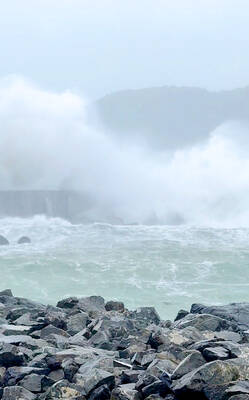
Heavy rain and strong winds yesterday disrupted flights, trains and ferries, forcing the closure of roads across large parts of New Zealand’s North Island, while snapping power links to tens of thousands. Domestic media reported a few flights had resumed operating by afternoon from the airport in Wellington, the capital, although cancelations were still widespread after airport authorities said most morning flights were disrupted. Air New Zealand said it hoped to resume services when conditions ease later yesterday, after it paused operations at Wellington, Napier and Palmerston North airports. Online images showed flooded semi-rural neighborhoods, inundated homes, trees fallen on vehicles and collapsed
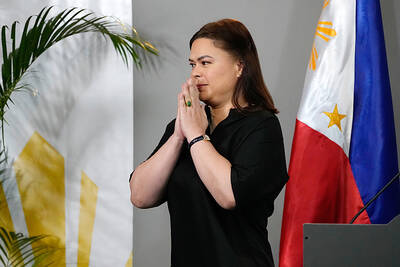
‘COST OF DEFECTION’: Duterte’s announcement could be an effort to keep allies in line with the promise of a return to power amid political uncertainty, an analyst said Philippine Vice President Sara Duterte yesterday announced she would run for president of the Southeast Asian nation of 116 million in 2028. Duterte, who is embroiled in a bitter feud with Philippine President Ferdinand Marcos Jr, was impeached last year only to see the country’s Supreme Court throw the case out over procedural issues. Her announcement comes just days before her father, former Philippine president Rodrigo Duterte, begins a pretrial hearing at the International Criminal Court (ICC) in the Netherlands over crimes against humanity allegedly committed as part of a brutal crackdown on drugs. “I offer my life, my strength and my future
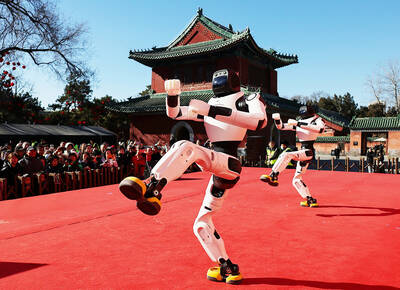
NOT YET THERE: While the show was impressive, it failed to demonstrate their ability to move in unstructured environments, such as a factory floor, an expert said Dancing humanoid robots on Monday took center stage during the annual China Media Group’s Spring Festival Gala, China’s most-watched official television broadcast. They lunged and backflipped (landing on their knees), they spun around and jumped. Not one fell over. The display was impressive, but if robots can now dance and perform martial arts, what else can they do? Experts have mixed opinions, with some saying the robots had limitations and that the display should be viewed through a lens of state propaganda. Developed by several Chinese robotics firms, the robots performed a range of intricate stunts, including martial arts, comedy sketches and choreographed
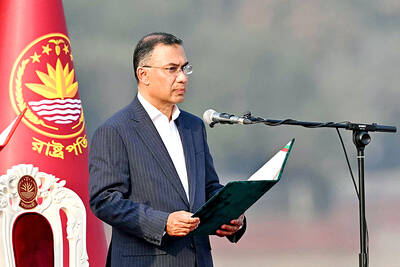
POST-UPRISING: Bangladesh Nationalist Party lawmakers were yesterday expected to formally elect Tarique Rahman as their leader and new head of government Bangladesh’s prime minister-to-be Tarique Rahman and lawmakers were yesterday sworn into parliament, becoming the first elected representatives since a deadly 2024 uprising. Rahman is set to take over from an interim government that has steered the country of 170 million people for 18 months since the autocratic government of Sheikh Hasina was overthrown. The lawmakers, who promised loyalty to Bangladesh, were sworn in by Chief Election Commissioner AMM Nasir Uddin. Bangladesh Nationalist Party (BNP) lawmakers are expected to formally elect Rahman as their leader, with President Mohammed Shahabuddin then to administer the oath of office to the prime minister and his ministers